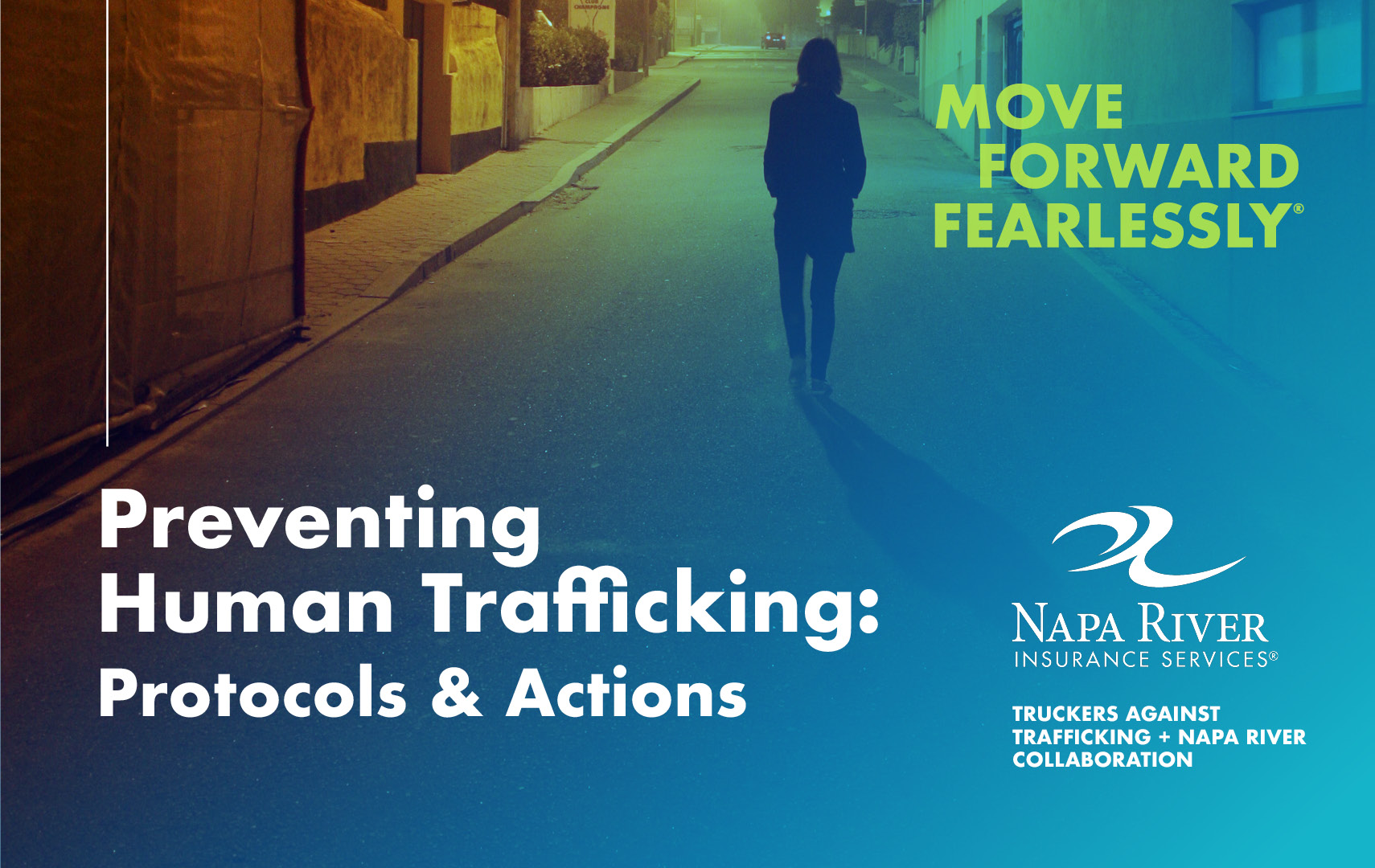
January is Human Trafficking Prevention Month, and Napa River has teamed up with Truckers Against Trafficking to help raise awareness of this pervasive issue.
Considering the seriousness of human trafficking, incorporating practices that highlight the importance and risk of human trafficking relative to the transportation landscape is vital to protecting of not only trafficking victims, but also your staff and your business.
THE RISK YOU FACE.
Trafficking is one of the fastest growing crimes of the 21st century, and because of its sometimes blurred nature with a lack of concrete red flags, it is often difficult to identify.
It is an issue that can affect your business both on and off the road, and as data suggests, most shopping or sex-buying transactions occur during or around the workday.
Drivers have the ability to see more on the road than anyone else, which puts them at a higher probability to spot and notify law enforcement of potential trafficking situations, and most importantly, stop active trafficking pursuits. TAT recognizes truckers as critical frontline personnel, placing them alongside those in the medical, service and hospitality fields.
On the contrary, truckers are also exposed to participating in these acts of violence. Research suggests that truckers may be heavy targets for traffickers, utilizing truck stops and rest areas for solicitation because of their convenient vicinity to the highway systems.
TACKLING TRAFFICKING HEAD-ON:
Stay informed, aware and educated on ways to keep your employees safe and bottom line protected. Below are regulations the United States Congress has set in place to enforce awareness and responsibility that directly affect the transportation industry.
Human Trafficking Prevention Act of 2022 More info
This act requires the posting of contact information of the national human trafficking hotline in specific places.
CDL Lifetime Disqualification for Human Trafficking More info
This law permanently bans drivers convicted of human trafficking from operating a CMV for which a commercial driver’s license or a commercial learner’s permit is required.
A CLEAR PATH FOR THE LONG HAUL: WHAT YOU CAN DO.
The corporate sector has an opportunity to leverage industry leadership and economic influence to raise awareness of this issue, empower everyone to take action, and lead by example.
By raising awareness through formal training, adopting explicit company-wide policies, and combining the efforts of anti-trafficking resources, law enforcement agencies and transportation industry stakeholders can facilitate a confidently coordinated response and have a major impact on the lives of everyone involved in human trafficking. Don’t know where to start?
- Strengthen your business and enforce safe work environments by educating staff with tools and information regarding the impact of and ways to prevent human trafficking.
- Create company-wide policies to help mitigate risk, while fostering a company culture based on awareness and respect for oneself, the company and vulnerable community members that may otherwise be subjected to the life-altering impacts of trafficking. This includes:
-
- Connecting with companies like Truckers Against Trafficking, who work specifically with businesses to fight human tracking.
- Adopting protocols and trainings that offer ways to minimize risk exposures and take action against human trafficking that fit within your business operations.
- Implementing a zero-tolerance policy for engaging in commercial sex of any kind.
- Initiating practices that promote transparency, trust and satisfaction between management and employees.
An anti-demand campaign such as Truckers Against Trafficking’s Man-To-Man Campaign addresses the issue and establishes the act of trafficking as abnormal behavior and one that goes against company policy.
TRUCKERS AGAINST TRAFFICKING.
Truckers Against Trafficking, or TAT, is a nonprofit organization with a mission to “educate, equip, empower and mobilize members of the trucking, bus and energy industries to combat human trafficking.” They understand the unique abilities of frontline personnel within the transportation industry to not only identify and interrupt an in-progress trafficking incident, but to also cultivate a company culture of awareness and personal responsibility that facilitates prevention. These actions go hand in hand with protecting trafficking survivors, your employees and your business.
Click here to go to the Truckers Against Trafficking website to learn more about how your business can benefit from preventing Human Trafficking.
MOVING FORWARD INTO A BETTER TOMORROW.
Recognizing the reality of human trafficking, educating employees at all levels of your organization and creating an explicit anti-trafficking company culture with specific policies in place will empower everyone involved to take action in the prevention and involvement of human trafficking.
To report suspected human trafficking to Federal law enforcement, please call 1.866.347.2423









